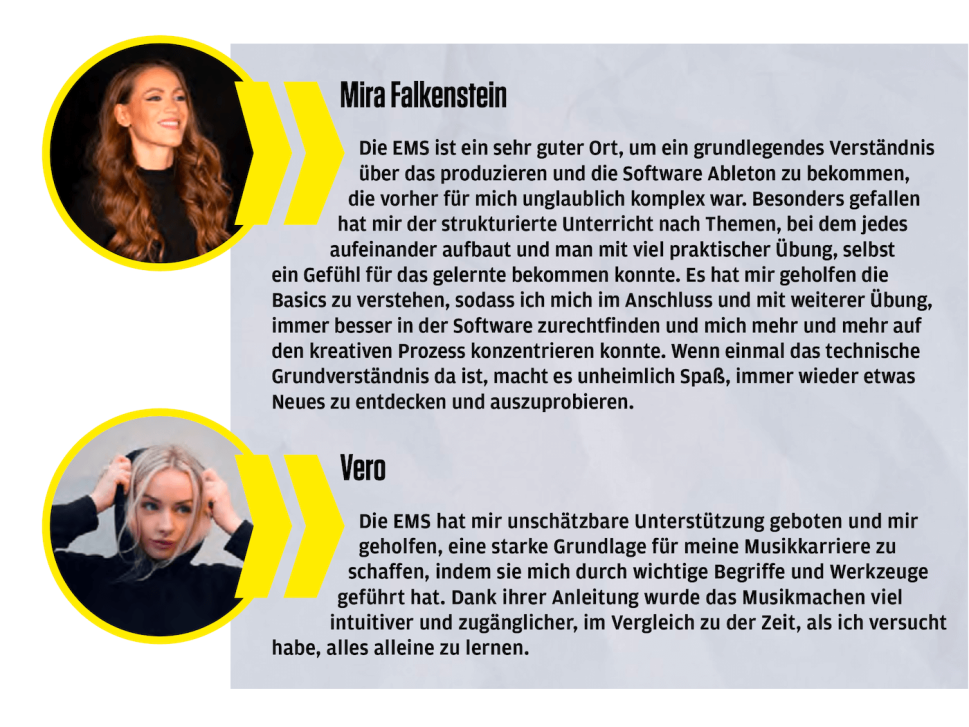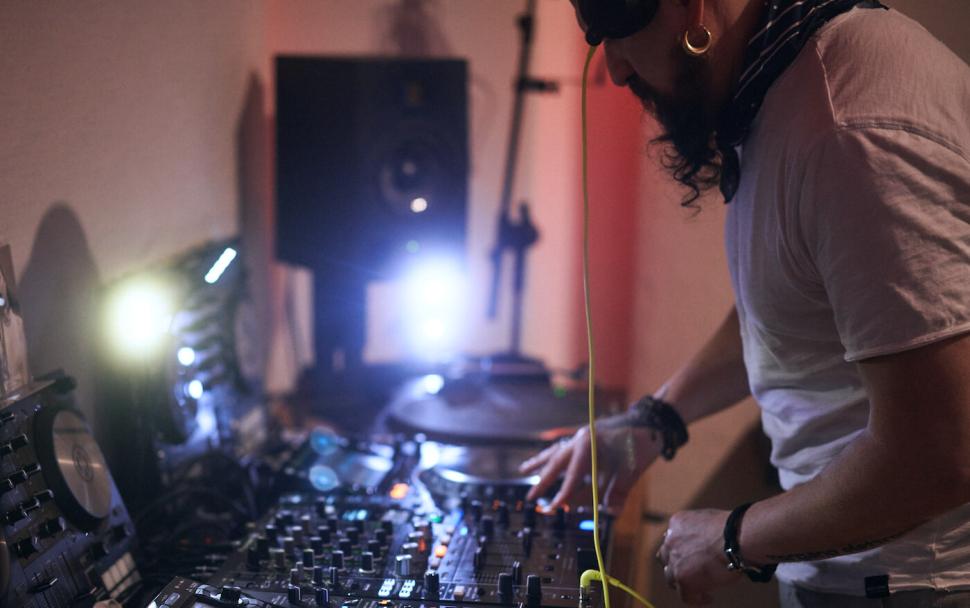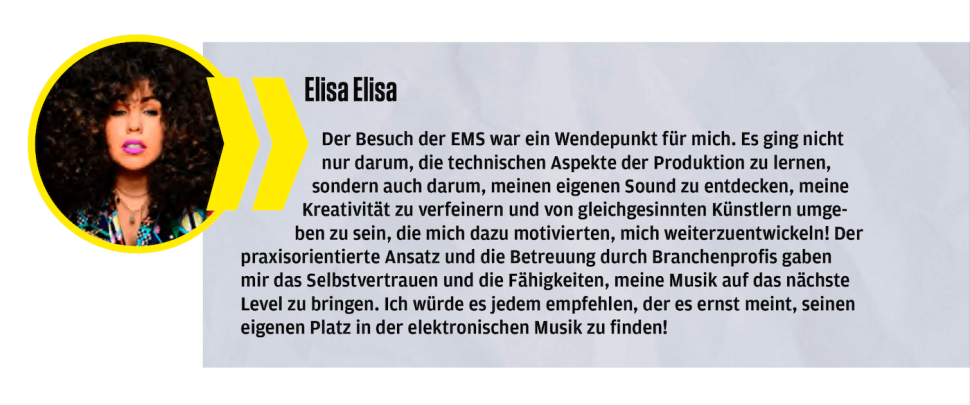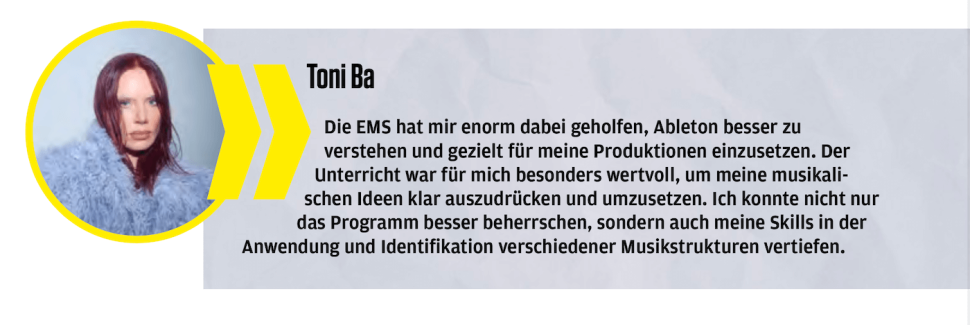On the 15th anniversary of the EMS – Electronic Music SchoolProducing, Learning and Marketing

Beat / Hi Jeyênne, finally 15! So, first of all, congratulations on your anniversary. And the first question: Why the EMS? What was the reason for its founding in 2010?
Jeyênne / The story of the EMS - Electronic Music School is also a part of my own. When I was once again in a creative rut, I looked for a way to continue – but without the pressure of constantly having to write club hits just to get gigs and pay my rent. As I‘ve always enjoyed sharing knowledge and have regularly coached alongside Music Production – including working with drug addicts, difficult-to-educate youth, and as a motivational coach – in 2008, I came up with the idea to start an online school or platform for Electronic Music.
In 2009, I met Björn Torwellen, who now leads the SINEE Community. At that time, he was giving the first Ableton workshops in recording studios. In April 2010, we officially founded the EMS – with a starting budget of just 5,000 Euro. The money was exhausted after two months, followed by turbulent times with many ups and downs. But we continued, more and more students joined, and the tasks became more diverse. After two years, Björn left, and I continued to run the EMS with my partner at that time.

Beat / What changes have you observed in the electronic music scene and production since its founding?
Jeyênne / Musically, much has remained the same, but technically, a lot has changed. In 2010, the selection of plug-ins was still manageable, but they were already solid in terms of sound. Today, thanks to AI and clever programming, we have reached a point I always hoped for – some plug-ins simply sound out of this world. The possibilities are so overwhelming that I sometimes almost get lost in them. To avoid that, I always return to the core of the track, to the feeling that drives it.
What I see, critically, is the influence of social media. Many no longer want to produce Electronic Music because they love it, but because they see that ‚Natasha Trixi‘ and ‚DJ Naked‘ have millions of followers and jet around the world in private jets. DJ sets and live acts are staged or even faked – and the tragic thing is: Many believe it, copy it, and do it even worse. It continues to spread even wider. But what many do not understand: Without a real foundation, this journey will eventually end. Those who do not truly understand Electronic Music will be left behind. The few who take it seriously in the end prevail – and rightly so.
Beat / What makes the EMS unique compared to other music schools?
Jeyênne / We are down-to-earth and approachable, rooted in Electronic Music and Techno from the beginning; we know the spirit, and live the message behind it – this is the basis of our teaching. We use Ableton Live and modern tools such as AI, cloud-based platforms, and subscription models for royalty-free samples, loops, and presets. Sure, sometimes ‚Music for the Masses,‘ but always with depth, so you benefit for your whole life – not just for a show that is quickly forgotten.
Anyone who has ever been with us knows: Here, you get 100 % support – sometimes 12 hours a day and often far beyond the courses and individual coaching. In five months at the latest, you will be able to produce and mix your track professionally. My goal is to bring out the absolute maximum from each student. And when they are up there, thousands cheer for them, and they can say: *‘I was with Jeyênne at the EMS‘* – then that is the greatest thing for me and the school.

Beat / Social media presence is everything, it seems sometimes. At least, they are important because you have to market your music as well. Besides producing, the students learn exactly that from you so that they don‘t just make music in solitude but also gain a foothold in the industry or scene. Can you tell us about a few success stories of former students who are now active in the music industry?
Jeyênne / Oh, there are quite a few! Isabelle Beaucamp is currently really successful, just like Mira Falkenstein from Cologne. Metaraph, who is signed to Ellen Allien‘s Bpitch Control, is now touring the world. Elisa Elisa and Carmen Elektro completed our Producer Course, and Toni Ba has just returned from a South American tour. Then, there is DJ Hyperdrive, Djingis Khan, Vero from the Netherlands... The Sindex label from Philine, Biliguudei from Mongolia, or Martinii from Mexico. All have completed at least the entry-level Producer Course.
And these are just a few examples – there are many more who can, at least partially or even completely, make a living from music.
Beat / How has the EMS course offering changed over the years and adapted to new trends?
Jeyênne / We constantly communicate with our DJs and Producers who perform or play live in clubs worldwide. Additionally, our students bring new trends into the school that they pick up. This way, we often know exactly what‘s currently going well in clubs and can continuously adapt our course offering to meet demand – ensuring we stay on the cutting edge.
Beat / What role does the Berlin club scene play for the EMS and its students?
Jeyênne / The EMS is represented at two locations – in Cologne and Berlin. Particularly in Berlin, despite noticeable club closures, remains a creative melting pot for new music and often a trendsetter for the International Scene. The club culture of the city is an invaluable source of inspiration and practical playground for our students. Here, they experience trends and sounds up close, build valuable networks, and can test their productions directly with the audience. Many of them are already behind the decks or on stage in Berlin clubs, gaining essential experience.
At the same time, the influences of this unique scene flow directly into our courses – whether through instructors deeply rooted in club culture or through exclusive insights into the mechanisms of the scene and industry.

Beat / How do you see the future of Electronic Music Production and how does the EMS prepare its students for it?
Jeyênne / We are in the process of establishing new short workshops like the Producer Week, where the focus is on refreshing or solidifying all the skills of a Producer in one week. However, this requires at least beginner knowledge. Additionally, we release free tutorials. Currently, we are experimenting a bit, as we don‘t want to do the same as everyone else. Our strength, however, remains the offline courses. Many come to us saying they are bored by tutorials as they aren‘t efficient and sustainable enough. They want to learn on location or attend online courses in real-time, with the possibility of participating actively. The effect is the same as with AI: Offline or in a group, it is simply more fun, and you produce differently.
Of course, we will continue to use more AI-supported plugins and integrate them into our courses, but as I mentioned before, AI is not going to take over the entire production workflow. If you‘re in it for quick money, you can already produce entire tracks with AI. If I want a music piece generated with AI, but don‘t know what to input, I have to learn how to put together the right melodies, rhythms, and chords and understand how tempo and mood relate in order to understand the essence of the music. So if you want to be taken seriously as a producer, artist, and DJ, then learn to produce *from scratch*. The fun factor is immense!
Beat / Looking back over the past 15 years, what makes you most proud?
Jeyênne / Three things: 1. The many students who started their DJ or Producer careers through the EMS and are still successful. 2. My team and I secured the two locations in Berlin and Cologne through the Coronavirus crisis and persevered despite numerous challenges. 3. I am very proud that the EMS continues to evolve, stays current, and has thoroughly positive future prospects – even in traditional producing.

Anyone currently worrying about AI Producers should relax: Your work and your industry branch will be safe in the future.
The EMS turns 15: Your start in electronic music production - with a competition!
To celebrate its 15th anniversary, the EMS is giving away a complete producer course and a DJ Week!
Take part at www.em-school.com/beat. The draw will take place on 15.04.2025, the winners will be notified by e-mail.
Want more? Get more!



Subscribe to the digital edition of BEAT Magazine via Plugins-Samples.com and get more gear, in-depth workshops, reviews and 11 GB exclusive plugins and new sounds with every monthly issue!
Subscribe to Beat Magazine for only 4.99€ per month
